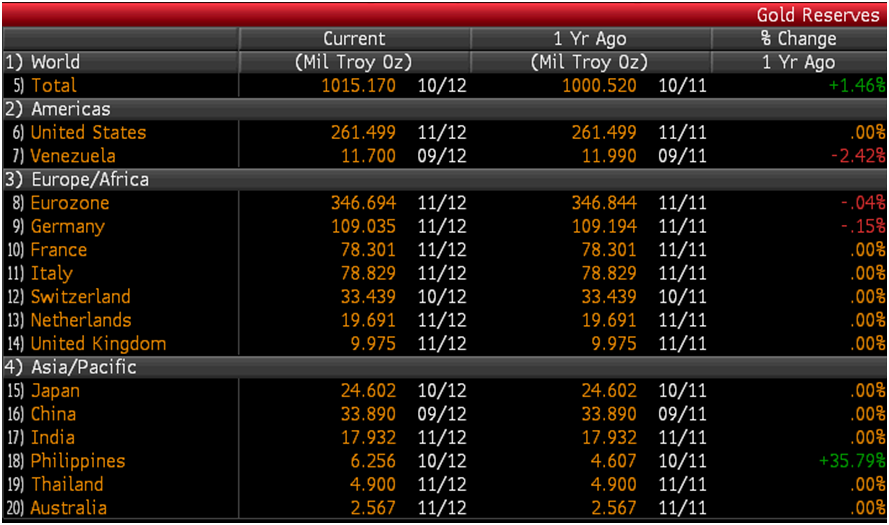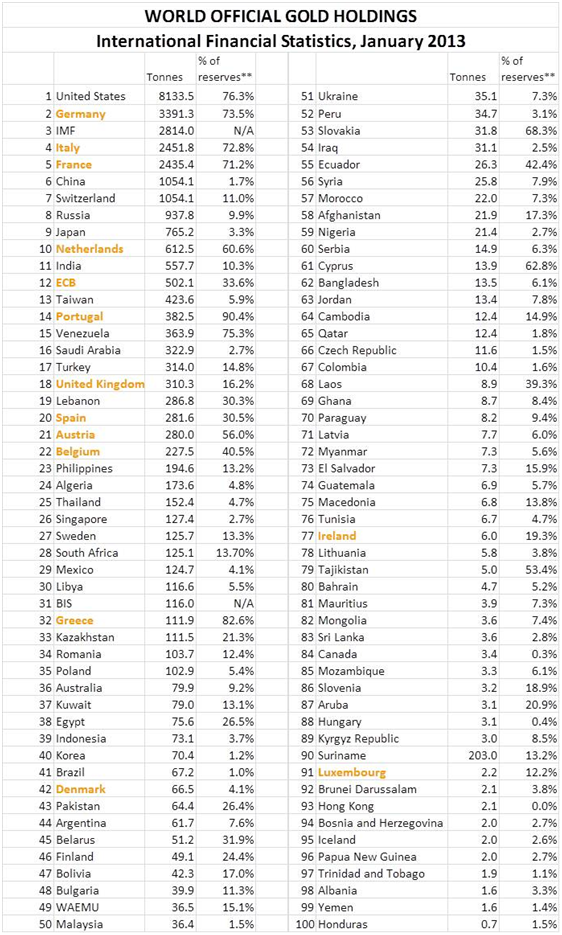From GoldCore
Gold Backed Bonds – An Alternative To European Austerity?
Today’s AM fix was USD 1,670.25, EUR 1,243.39, and GBP 1,058.93 per ounce.
Yesterday’s AM fix was USD 1,677.00, EUR 1,258.06, and GBP 1,059.18 per ounce.
Silver is trading at $31.55/oz, €23.54/oz and £20.04/oz. Platinum is trading at $1,689.00/oz, palladium at $723.00/oz and rhodium at $1,200/oz.

Cross Currency Table — Bloomberg
Gold dropped $17.90 or 1% in New York yesterday and closed at $1,667.70/oz. Silver slipped to a low of $31.60 and finished with a loss of 1.8%. Most traders were at a loss to explain the counter intuitive losses given the bullish backdrop.
Gold in Euros — 5 Years (Daily) – Bloomberg
Overnight gold bounced back from an almost 2 week low and was again especially strong in yen terms – strengthened by the Bank of Japan’s stance on aggressive monetary easing.
Russia’s Central Bank said it will continue to buy gold bullion as it seeks to diversify its foreign reserves away from paper assets, such as the euro, it views as more risky.
At Davos, George Soros, one of the largest buyers of gold in the world today, warned of currency wars and that “interest rates are going to take a big leap” – probably this year.
Bank of America warned of a “bond crash” comparable to 1994 that would trigger a string of upsets across the world. In 1994, the bond crash bankrupted Orange Country, California, and set off the Tequila Crisis in Mexico.
Today, the world is much more fragile and the increasingly likely bond crash could lead to a Lehman style systemic crisis — but on an even greater scale.
These risks and the recent price drop has fuelled buying interest in physical metal and a minority of smart money gold buyers continue to diversify into allocated gold on the dip .
At 1500 GMT new U.S. new home sales data is released.
Across Europe, economic growth is faltering and in many Eurozone countries, sovereign debt yields are dangerously high and austerity measures are creating much hardship.
The World Gold Council has been exploring ways that Eurozone member states could use their gold reserves to help bring down the cost of borrowing.
The Eurozone is the largest sovereign holder of gold in the world and has over 10,000 tonnes of gold reserves. The Eurozone, including the ECB, has 10,787.4 tonnes of gold worth over a significant €450 billion. Some of the countries worst affected by the crisis, including Portugal and Italy, own a significant proportion of these assets. Italy alone holds nearly 2,000 tonnes of gold.
The Eurozone as a whole has 32.6% more gold reserves than the U.S. which has 8,133.5 tonnes of gold.
Due to the ongoing global debt crisis and significant systemic and monetary risk, it would be financial and monetary folly of the highest order to sell gold. Indeed, prudent creditor nation central banks are continuing to add to their gold reserves.
Most agree that outright sales of gold are not the answer. Aside from the obvious problem that the outstanding debt level of the struggling European countries far surpasses the value of their gold reserves, existing EU laws prohibit such a move to finance governments, as do the provisions of the Central Bank Gold Agreement, which limits gold sales.
To illustrate this point, the gold holdings of the crisis hit Eurozone countries (Portugal, Spain, Greece, Ireland and Italy) represent only 3.3% of the combined outstanding debt of their central governments.
A one-time sale of all of their gold reserves would probably not cover even one year’s worth of their debt service costs. This would be akin to an individual selling everything they owned in order to make one month’s mortgage payment.
However, there may be an alternative to selling gold for desperate cash strapped nations facing vicious austerity. The alternative is to use European gold reserves in a way that will buy time for growth to take hold.
The World Gold Council and leading academics and international think tanks believe that using a portion of a nation’s gold reserves to back sovereign debt would lower sovereign debt yields and give some of the Eurozone’s most distressed countries time to work on economic reform and recovery.
According to research done by the World Gold Council using the European gold reserves as collateral for new sovereign debt issues would mean that without selling an ounce of gold, Eurozone countries could raise €413 billion. This is over 20% of Italy’s and Portugal’s two year borrowing requirements.
The move to back sovereign bonds with gold would lower sovereign debt yields, without increasing inflation, which would help to calm markets. This should give European countries some vital breathing space to work on economic reform and recovery.
Some citizens would be concerned that there may be a risk that the sovereign nations who pledge their gold as collateral could ultimately end up losing their gold reserves to the ECB, or whoever the collateral of the gold reserves are pledged to, in the event of a default.
Unlike currency debasement and the printing and electronic creation of money to buy sovereign debt, under schemes such as Draghi’s “outright monetary transactions” (OMT), the use of gold as collateral would not create fiscal transfers between Eurozone members, long term inflation or currency devaluation risk.
The proposal shows how gold is being increasingly seen as a safe haven asset and currency.
Indeed, it suggests that those who have suggested returning to some form of gold standard are not as deluded as they have often been portrayed.
Mobilising Europe’s gold is a temporary move which the World Gold Council and leading academics believe will help to create a more permanent solution which in time would help the Eurozone extract itself from its debt crisis.
Europe and the world faces an exceptionally challenging period and unconventional policy responses are called for.
A gold-backed bond may offer at least a partial solution to Europe’s woes.
The video ‘Leveraging Gold Reserves To Help Lower Eurozone Sovereign Debt Yields’ explores why such a measure could offer an alternative to austerity for the Eurozone: ‘Leveraging Gold Reserves To Help Lower Eurozone Sovereign Debt Yields’
Gold Seen by Morgan Stanley Extending Rally as QE3 Runs to 2014 – Bloomberg
Gold bounces from near 2-week low on euro, Japan policy – Bloomberg
Interest Rates Will Spike This Year: Soros – CNBC
Petrol Price Rise On Way As ‘Floodgates Open’ — Sky News
Russia central bank to keep buying gold: Ulyukayev – Brecorder
Ghana may repatriate Gold reserves from US, Europe — Bullion Street
COMMENTARY
Video: Gold Price To Rise In 2013 — The Telegraph
Bank of America issues `bond crash’ alert on Fed tightening fears — The Telegraph
Video: Dalio’s Perspective on Gold’s Importance As Diversification – CNBC
Who Are the Whales Buying Gold? — Economic Policy Journal
For breaking news and commentary on financial markets and gold, follow us on Twitter.
(3 votes)
![]()









